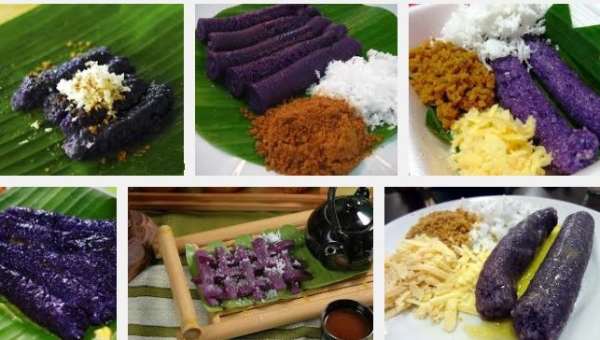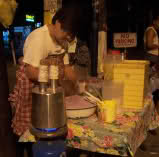Puto bumbong is one of the favorite Christmas delicacies of Filipinos. It is derive from the words “puto” (steamed glutinous rice) and “bumbong” (bamboo canon or cylinder).

It is considered a delicacy that has a unique preparation. It makes use of a “lansungan”, a heat steamer mounted on a pot of boiling water. It is kettle shaped with (ordinarily) two tubes that protrude and hold the “bumbong” or bamboo tubes filled with the needed ingredients and steamed through.
It takes only seconds for the puto bumbong to cook and the speed at which it is done is almost as fascinating as the taste. Almost.
This is a great business idea for anyone who want to start a food delicacy business. You can sell puto bumbong all year round partnered with hot chocolate or tea.
Ingredients:
* 1 cup glutinous rice
* 2 tsp purple food color (ube)
* 2 cups water * panutsa
* panutsa
Utensils:
* knife
* muslin cloth
* sifter or strainer
* 2 pcs bamboo tube (bumbong)
* steamer for making puto
Procedure:
1. Soak glutinous rice in water overnight.
2. Grind the soaked rice.
3. Mix food color while the glutinous rice is being ground.
4. Wrap the ground glutinous rice on a piece of muslin cloth and place it in a strainer to drain excess liquid. Another technique in draining excess liquid is by pressing a heavy object that has been placed over the muslin cloth.
5. Once the ground rice has slightly dried, rub it against the screen of a strainer to produce coarse grained rice flour.
6. The rice flour for making puto bumbong is now ready to cook. Fill each bamboo tube (bumbong) with just enough glutinous rice and put them into the steamer. See to it that the steamer contains boiling water.
7. Steam rice flour in the bamboo tubes for 10 minutes.
8. Once cooked, shake out the contents of each bamboo tube or remove the cooked glutinous rice from the bumbong with the help of a knife.
9. Spread butter on the puto bumbong and place a small piece of panutsa (sugar cane sweets).
10. Add a small amount of grated coconut before serving.
11. This recipe is good for 6-8 pieces of puto bumbong.
Source: tlrc.gov.ph
